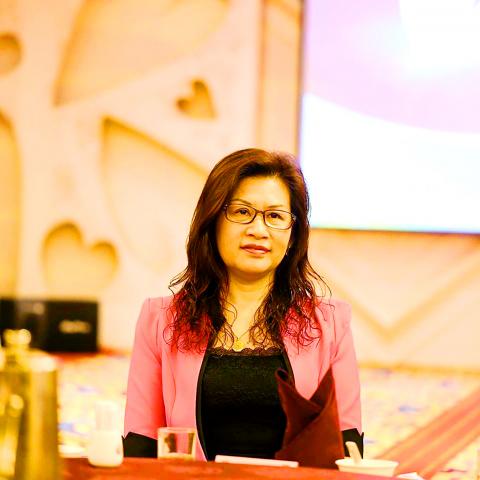The Taipei District Prosecutors’ Office said that Ho Jianghua (何建華), a legislator-at-large nominee for the Chinese Unification Promotion Party (CUPP), could be charged with vote-buying after allegedly leading a five-day tour on which most expenses were paid by the Chinese government.
On Monday, Ho was to be released on NT$200,000 bail, but she told prosecutors that she could not pay. They still released her, but restricted her travel.
The investigation is “political persecution,” Ho said, adding that the tour was unrelated to the Jan. 11 elections.

Photo: Screen grab from Facebook
“The participants paid the NT$7,800 cost of the five-day trip,” Ho said. “It was not vote-buying.”
The 16 tour participants were questioned and released on Monday, without bail.
Investigators said they have enough evidence of Chinese funds subsidizing the tour, which started in Kinmen and traveled via the “small three links” — from Penghu, Kinmen and Lienchiang (Matsu) counties — to Xiamen in China’s Fujian Province.
A cost of NT$7,800 per person only covers the airfare and other transportation costs (NT$6,600), as well as travel insurance and an administration fee (NT$1,200), leaving accommodation, meals and other expenses to be covered by Chinese funds, the investigators said.
An examination of cellphone messages showed that participants urged friends to vote for the party and its candidates in the election, and included messages that read: “Thanks to Chairwoman [Ho]” and “Hope our chairwoman gets elected,” the investigators said.
This indicated that the tour was meant to garner votes for the CUPP and Ho, they added.
Ho, 56, is a high-ranking member of the pro-China CUPP, founded by Chang An-le (張安樂).
Ho is also chairwoman of the Taipei-based Chinese Women’s Federation, a pro-China organization whose members are mostly Chinese women who married and settled in Taiwan.
The organization’s Facebook and social media pages support Taiwan’s annexation by China and other pro-Beijing views, while condemning advocates of Taiwanese independence.
Born in China’s Hunan Province, Ho in 1996 married her Taiwanese husband and came to live in Taiwan. Having fulfilled residency requirements and received citizenship, she is eligible to vote and run for public office.

MORE VISITORS: The Tourism Administration said that it is seeing positive prospects in its efforts to expand the tourism market in North America and Europe Taiwan has been ranked as the cheapest place in the world to travel to this year, based on a list recommended by NerdWallet. The San Francisco-based personal finance company said that Taiwan topped the list of 16 nations it chose for budget travelers because US tourists do not need visas and travelers can easily have a good meal for less than US$10. A bus ride in Taipei costs just under US$0.50, while subway rides start at US$0.60, the firm said, adding that public transportation in Taiwan is easy to navigate. The firm also called Taiwan a “food lover’s paradise,” citing inexpensive breakfast stalls

PLUGGING HOLES: The amendments would bring the legislation in line with systems found in other countries such as Japan and the US, Legislator Chen Kuan-ting said Democratic Progressive Party (DPP) Legislator Chen Kuan-ting (陳冠廷) has proposed amending national security legislation amid a spate of espionage cases. Potential gaps in security vetting procedures for personnel with access to sensitive information prompted him to propose the amendments, which would introduce changes to Article 14 of the Classified National Security Information Protection Act (國家機密保護法), Chen said yesterday. The proposal, which aims to enhance interagency vetting procedures and reduce the risk of classified information leaks, would establish a comprehensive security clearance system in Taiwan, he said. The amendment would require character and loyalty checks for civil servants and intelligence personnel prior to

US PUBLICATION: The results indicated a change in attitude after a 2023 survey showed 55 percent supported full-scale war to achieve unification, the report said More than half of Chinese were against the use of force to unify with Taiwan under any circumstances, a survey conducted by the Atlanta, Georgia-based Carter Center and Emory University found. The survey results, which were released on Wednesday in a report titled “Sovereignty, Security, & US-China Relations: Chinese Public Opinion,” showed that 55.1 percent of respondents agreed or somewhat agreed that “the Taiwan problem should not be resolved using force under any circumstances,” while 24.5 percent “strongly” or “somewhat” disagreed with the statement. The results indicated a change in attitude after a survey published in “Assessing Public Support for (Non)Peaceful Unification

The China Coast Guard has seized control of a disputed reef near a major Philippine military outpost in the South China Sea, Beijing’s state media said, adding to longstanding territorial tensions with Manila. Beijing claims sovereignty over almost all of the South China Sea and has waved away competing assertions from other countries as well as an international ruling that its position has no legal basis. China and the Philippines have engaged in months of confrontations in the contested waters, and Manila is taking part in sweeping joint military drills with the US which Beijing has slammed as destabilizing. The Chinese coast guard